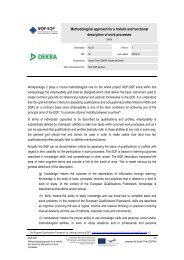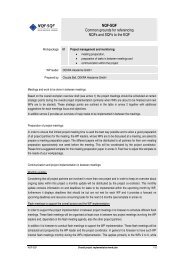Overview of National Qualification frameworks - Project-Nqf-Sqf
Overview of National Qualification frameworks - Project-Nqf-Sqf
Overview of National Qualification frameworks - Project-Nqf-Sqf
You also want an ePaper? Increase the reach of your titles
YUMPU automatically turns print PDFs into web optimized ePapers that Google loves.
__ access to education and training programmes;__ admission to exams to acquire formal qualifications/certificates/diplomas;__ access to other forms <strong>of</strong> validation or transfer <strong>of</strong> learning in order to obtain a formalqualification (partial or full).Please describe those briefly.The NQF development process is organised into three strands (Korridore): formal qualifications,qualifications acquired in non-formal learning (for example in adult education institutions outside theformal education and training system) and informal learning. The policy paper (Aufbau eines <strong>National</strong>enQualifikationsrahmens in Österreich – Schlussfolgerungen, Grundsatzentscheidungen und Maßnahmennach Abschluss des NQR-Konsultationsverfahrens, prepared by the NQF project group <strong>of</strong> the FederalMinistry <strong>of</strong> Education, Arts and Culture and the Federal Ministry <strong>of</strong> Science and Research. 2009)suggests some steps for including non-formal qualifications in the NQF. A conceptual paper will beprepared and pilot projects carried out on how to describe these qualifications in the terms <strong>of</strong> learningoutcomes. Discussion will start with all relevant stakeholders on linking validation and allocation <strong>of</strong>non-formal qualifications to the NQF and on establishing validation and quality assurance procedures.Possibilities for recognition <strong>of</strong> non-formal or informal learning outcomes in the VET system:There is no uniform legal framework and no explicit national strategy to regulate or coordinatevalidation and recognition <strong>of</strong> non- formal and informal learning in Austria. Austria’s currentcertification policy focuses on ‘external examination’: almost all qualifications (from the school systemand dual system, but not university degrees) can be obtained without participating in the relevantprogrammes or courses, but not without passing the same exam (as ‘externals’) as required in the regularsystem.There are various possibilities to have non-formal or informal learning recognized in the Austrian VETsystem. Such examples include:Access to education and training programmes:_Persons who want to attend a secondary vocational school on a part-time basis while working, canenter in a later school year after an entry examination._Along with graduates from various courses <strong>of</strong> study at universities, persons with relevant nonuniversitytraining and pr<strong>of</strong>essional experience are allowed access to CVET university courses.Admission to exams:_ Exceptional admission to the apprenticeship examination: In addition to those who have completed anentire apprenticeship, people without formal training can take the final apprenticeship examination. Theonly requirement is that they are over 18 years old and have evidence <strong>of</strong> having acquired thecorresponding vocational skills and knowledge in another form; for example, in practice (workexperience) or in courses._Since 2002, the master craftsperson examination (Meisterprüfung) is structured in modules withindividual units allowed to credit knowledge, skills and competence gained through relevantpr<strong>of</strong>essional work experience. However, the master craftsperson examination has no other requirementthan being over 18 years old; it no longer needs evidence <strong>of</strong> formal training or work experience._In theory, all subjects in all public schools (including VET schools) can be covered by ‘externalexamination’._The IVET trainer examination is open to people over the age <strong>of</strong> 18.Awarding <strong>of</strong> the pr<strong>of</strong>essional title Ingenieur:




